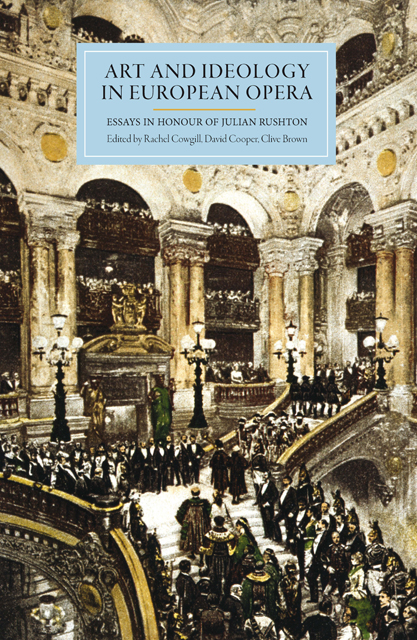Book contents
- Frontmatter
- Contents
- List of Figures
- List of Music Examples
- List of Tables
- Notes on Editors and Contributors
- Acknowledgements
- Introduction
- I Nationalism, Cosmopolitanism and National Opera
- II Opera, Class and the Politics of Enlightenment
- III Opera and Otherness
- Julian Rushton: A Family Memoir
- 7 The Works of Julian Rushton
- Index
- Tabula Gratulatoria
5 - Janáček, Nejedlý and the Future of Czech National Opera
Published online by Cambridge University Press: 28 February 2023
- Frontmatter
- Contents
- List of Figures
- List of Music Examples
- List of Tables
- Notes on Editors and Contributors
- Acknowledgements
- Introduction
- I Nationalism, Cosmopolitanism and National Opera
- II Opera, Class and the Politics of Enlightenment
- III Opera and Otherness
- Julian Rushton: A Family Memoir
- 7 The Works of Julian Rushton
- Index
- Tabula Gratulatoria
Summary
On 27 May 1910, Leoš Janaček went to Prague to hear Zdeněk Nejedly give the last of his university extension lectures on Czech opera after Smetana. Then fifty-five, Janaček had already retired from his main day-job at the Brno Teachers’ Institute, and although he still taught at the Brno Organ School, he could, as director of this little conservatory, allow himself occasional jaunts to Prague. His third opera Její pastorkyňa [Her Stepdaughter], usually known outside the Czech lands as Jenůfa, had been given successfully in Brno in 1904, but had been turned down in Prague. This had set him off on an experimental trail of writing operas that might have more appeal in the Czech capital. And, to guide these new creative endeavours – Osud [Fate] (1903–5) and Výlet pana Broučka do měsíce [The Excursion of Mr Brouček to the Moon] (begun in 1908) – he was in search of new foreign models. Charpentier's Louise, a sensation in Prague in 1903, vindicated Janaček's new paths in Fate, but also suggested other ones. A couple of weeks before Nejedly's lecture, Janaček spent his Whitsun holidays in Prague attending performances of Strauss's Elektra and a fashionable novelty, Jean Nougues's five-act opera Quo vadis?, that had started its sensational if brief career at Nice the previous year. Janaček's return visit to Prague on 27 May was much shorter (he seems to have departed the next day) and undertaken expressly to hear Nejedly's lecture, which would include a discussion of Jenůfa.
Janaček's reputation as the most substantial, innovative and successful opera composer to emerge from the Czech lands during the twentieth century was gained only after the triumphant performance of Jenůfa in Prague in 1916. Zdeněk Nejedly (1878–1962), however, had dominated the Czech lands almost from the beginning of the century; and his reputation as the most influential Czech music critic and ideologue, established by virtue of his clear agenda, intemperance and tenacity, would continue long after he abandoned this career and culminate in the stranglehold he maintained on Czech culture as a minister in the postwar Communist administration.
- Type
- Chapter
- Information
- Art and Ideology in European OperaEssays in Honour of Julian Rushton, pp. 103 - 121Publisher: Boydell & BrewerPrint publication year: 2010



